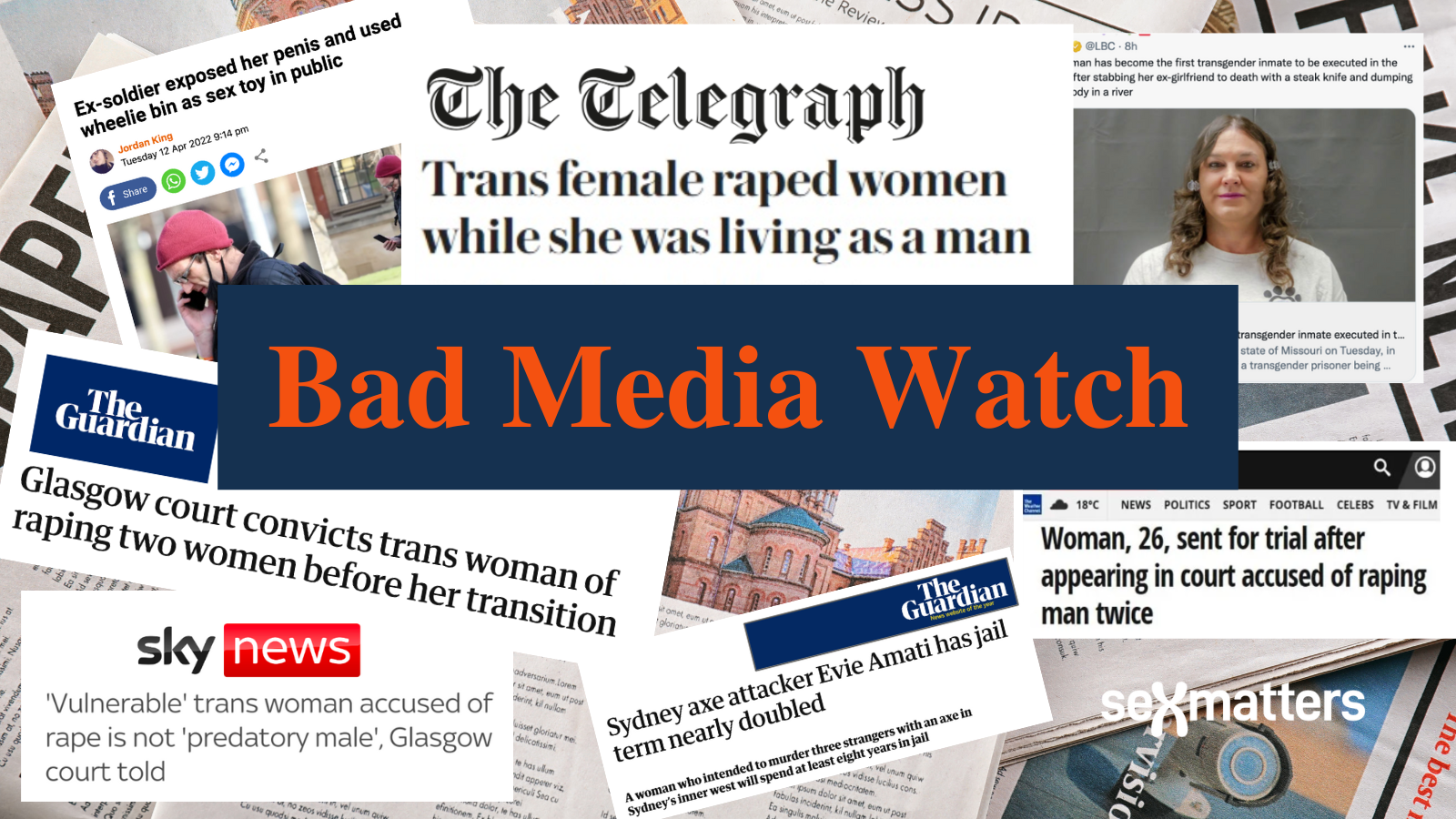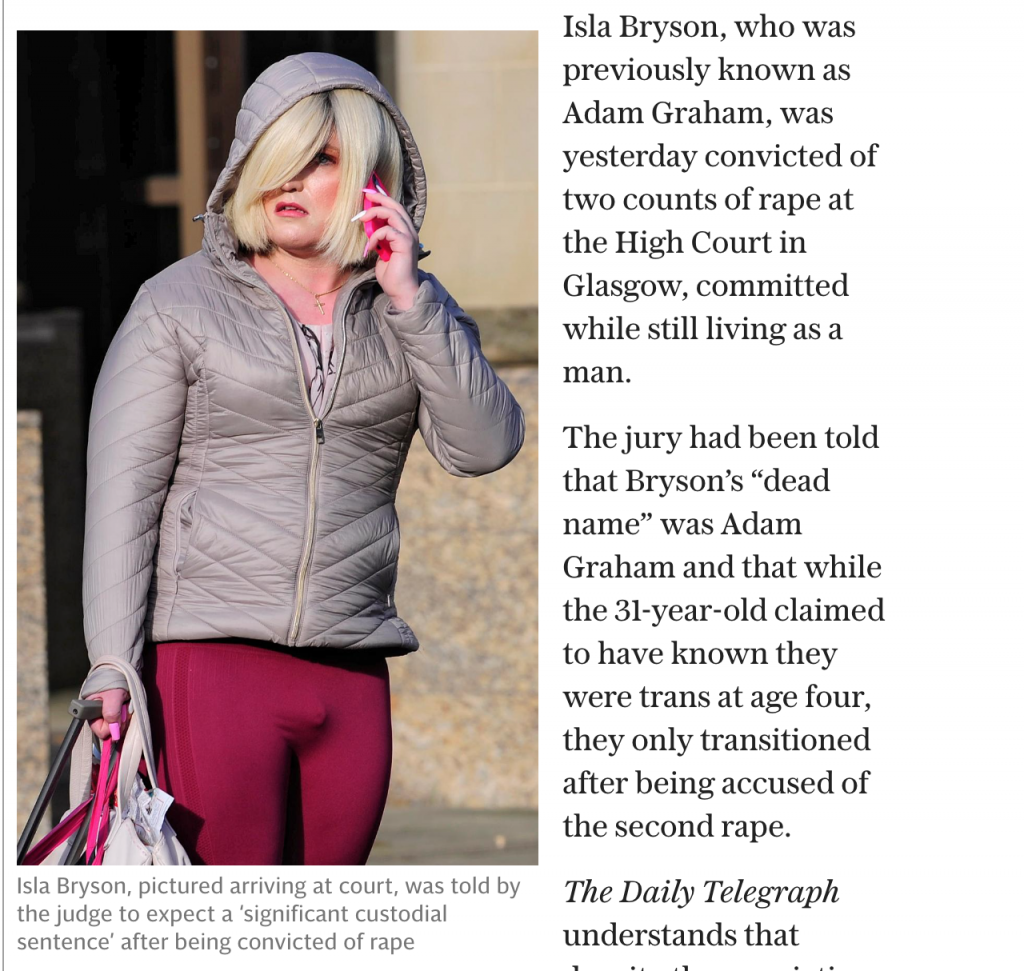Call out bad reporting with our new tool

Media coverage of sex and gender is often confused, biased, misleading or simply wrong.
This has become clearer than ever in recent weeks as the spotlight has fallen on Adam Graham, a man who decided he was a woman after appearing in court on rape charges. As in previous rape cases, his demand to be treated as a woman was greeted with immediate acquiescence, with the judge and lawyers referring to him as “she”. His defence lawyer even suggested that his “transition” – Graham had acquired a pink suitcase and jacket, long pink fingernails, and a blonde wig that hid his facial tattoos – weighed in the balance on the side of a “not-guilty” verdict:
“If you accept that evidence, that she is transitioning, that she is aiming to continue on the path to becoming female gender, that goes a long way to acquitting her of these [rape] charges.”
Edward Targowski KC
Graham was found guilty; he was then sent to a women’s prison while his sentence was decided. As a result it has finally come to wide attention that Scottish Prison Service has been accommodating prisoners on the basis of their self-declared gender identity since 2014.
Similar cases have been ignored by mainstream media in the past. What made the difference this time was that Graham is in Scotland, where the Gender Recognition Reform Bill had just been passed, and his case was a perfect example of the way its regime of self-ID regime would work.
The GRR bill’s progress towards becoming law has been halted for now by Westminster issuing a Section 35 order – a mechanism for blocking Scottish legislation that oversteps devolved matters and strays into areas reserved to the UK government. Graham does not possess a gender-recognition certificate issued under the current, UK-wide regime. Even so, almost every media outlet immediately decided to refer to him as a woman and as “Isla Bryson”, his recently adopted woman’s name.
“Trans female raped women while she was living as a man”, reported the Telegraph (later amended online). “Glasgow court convicts trans woman of raping two women before her transition”, wrote the Guardian. “Transgender woman found guilty of rape when she was a man”, said the Independent. Most reports used female pronouns and Graham’s female name throughout; Graham was referred to as “a woman” and “a female”. There were many references to “her penis” – its outline was visible in photographs of Graham in tight pink leggings.

Many print and broadcast editors have accepted the claim that it is bigoted (or perhaps even illegal) for a journalist to mention a person’s sex, or any name they previously went by, if that person does not want those facts mentioned. Many have also accepted trans lobby groups’ misrepresentations of scientific evidence and of the law. As a result, they have abandoned core journalistic principles, which should prioritise editorial independence, accuracy and comprehensibility.
It is well worth giving feedback to outlets about errors, bias or misrepresentations around issues of sex and gender. If you point out an outright error it should be corrected, and if it is not you may be able to escalate your complaint to a regulator, readers’ editor or ombudsman. Complaints may not produce immediate results, but if there are enough they will have an influence. Negative feedback can lead editors to think again about their approach to stories; positive feedback encourages them to keep doing better.
Take action: complain about poor journalism on sex and gender
The point is not to police which topics are covered in the media, or the words used, but to help journalists hold the line against misleading claims and confusing language, and to demonstrate to commissioning editors that sex-realist beliefs are commonplace and rooted in fact, not bigotry.
Journalists, broadcasters and media outlets have a right to freedom of expression. That includes their audience’s right to receive information, ideas, and content that may be contentious or offensive (including material that you personally find contentious and offensive).
Sex Matters has produced a media handbook for journalists and editors, and today we launch our Bad Media Watch for readers and viewers, to advise them how best to make a complaint and to help us track bad reporting on sex and gender.
Both are intended to cover UK print, online and broadcast journalism, and are based on UK laws and media regulation. Bad Media Watch does not cover specialist legal issues, such as defamation, privacy, contempt of court, legal rights of anonymity and other types of reporting restrictions. It is intended for stories that misrepresent issues of sex and gender, in either content or the language that is used.
What can you do about poor reporting on sex and gender?
| I noticed an error in an item on sex and gender | Send a correction |
| I think a story has been presented in a confusing manner | Write a private letter to the journalist and their editor, and send them our Media handbook |
| I disagree with the coverage of an issue related to sex and gender | Call in to the radio programme or write a public letter |
| I think a print or broadcast item about sex and gender breaches the Editors’ Code / BBC Editorial Guidelines / Broadcast Code | Make an official complaint to the outlet |
| I am not satisfied by how my complaint was dealt with | Refer it to IPSO / Ofcom |
Use Bad Media Watch to tell us about the stories you see, and to find out what to do next. (NB we cannot make complaints for you – you have to do it yourself!)
